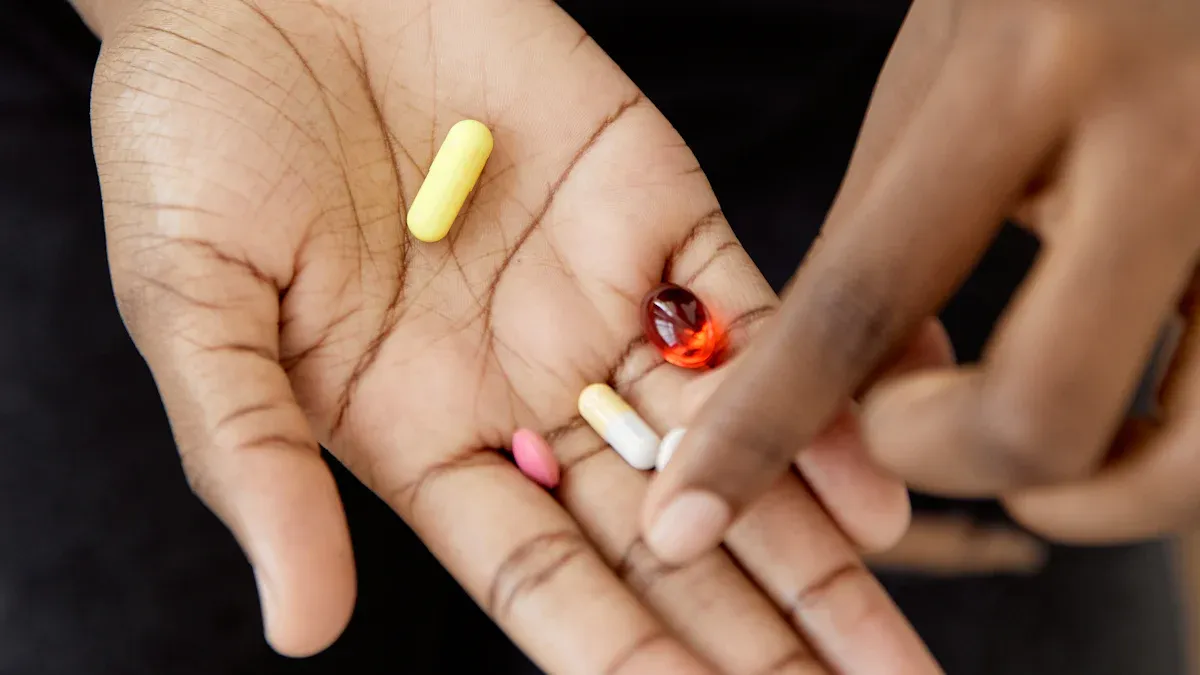How Vitamins Help Fight Cancer Naturally

Vitamins play a crucial role in helping your body defend itself against cancer and highlight the importance of vitamins in this process. They strengthen your immune system, reduce harmful inflammation, and protect your cells from damage. For example, research shows that higher niacin intake can lower the risk of tumors by up to 22%. On the other hand, low levels of certain nutrients, like β-carotene, have been linked to a higher risk of lung cancer. By including the right vitamins in your diet, you can naturally support your body’s ability to fight cancer and maintain cellular health, emphasizing the cancer and importance of vitamins in your overall well-being.
Key Takeaways
Vitamins make your immune system stronger and lower swelling. This can help reduce the chance of getting cancer.
Antioxidants like vitamins C, E, and A protect cells. They stop damage from free radicals, which may prevent cancer.
Eat foods with lots of vitamins like fruits, veggies, nuts, and fatty fish. These help your body fight cancer naturally.
Talk to your doctor before using vitamin pills, especially if you are getting cancer treatment, to stay safe.
Cancer and Importance of Vitamins
Antioxidant Properties
Antioxidants play a crucial role in protecting your body from harmful molecules called free radicals. These unstable molecules can damage your cells and increase the risk of cancer. Vitamins like C, E, and A act as powerful antioxidants, neutralizing free radicals and preventing oxidative stress. This process helps maintain cellular health and reduces the likelihood of mutations that could lead to cancer.
Clinical studies highlight the effectiveness of antioxidant vitamins in cancer prevention. For example:
A study of 4,877 breast cancer survivors in Shanghai revealed that using antioxidants, including vitamins C and E, lowered the risk of recurrence and overall mortality.
Research on breast cancer stem cells emphasizes the role of antioxidants in combating cancer at its root.
By including antioxidant-rich foods like citrus fruits, nuts, and leafy greens in your diet, you can naturally support your body’s defense against cancer.
Reducing Inflammation
Chronic inflammation can create an environment where cancer thrives. Vitamins like D and E help reduce inflammation, protecting your body from cancer development. Vitamin D, in particular, has shown remarkable effects in reducing inflammation associated with colorectal cancer.
Higher levels of vitamin D in your blood correlate with a 39% lower risk of colorectal cancer. This vitamin enhances your immune function and suppresses harmful pro-inflammatory cytokines like TNF-α and IL-6. At the same time, it promotes anti-inflammatory cytokines such as IL-4 and IL-10. These actions not only reduce inflammation but also inhibit cancer cell growth and encourage their natural death, a process called apoptosis.
Incorporating vitamin D into your diet through foods like fatty fish, fortified milk, and egg yolks can help you combat inflammation and lower your cancer risk.
DNA Protection and Repair
Your DNA carries the instructions for every function in your body. Damage to DNA can lead to mutations, which may result in cancer. Vitamins like A, C, and E play a vital role in protecting and repairing your DNA.
Vitamin C, for instance, helps repair damaged DNA and prevents further harm caused by oxidative stress. It also inhibits the proliferation of cancer cells, as seen in thyroid and pancreatic cancers. Vitamin E, on the other hand, protects your DNA by reducing oxidative damage and maintaining cellular integrity.
The following table highlights the impact of these vitamins on different types of cancer:
Vitamin | Cancer Type | Findings |
|---|---|---|
Vitamin C | Thyroid Cancer | Inhibits proliferation of thyroid cancer cells. |
Vitamin C | Pancreatic Cancer | Reduces risk from meat-derived mutagen exposure. |
Vitamin D | Various Cancers | High levels associated with lower incidence of lung and liver cancer. |
Vitamin E | Lung Cancer | Appropriate supplementation reduces risk. |
Vitamin E | Gastrointestinal Cancer | Maintaining high levels reduces risk. |
By consuming a variety of fruits, vegetables, and nuts, you can ensure your body gets the vitamins it needs to protect and repair your DNA. This natural approach strengthens your body’s defenses and reduces the risk of cancer.
Key Vitamins for Cancer Prevention

Vitamin D and Cell Growth
Vitamin D plays a critical role in regulating cell growth, which is essential for preventing cancer. This vitamin helps your body maintain healthy cells by promoting cellular differentiation. Differentiation ensures that cells develop specific functions and do not grow uncontrollably, a hallmark of cancer.
Studies show that higher sunlight exposure, which boosts your body's vitamin D production, correlates with lower cancer rates. Researchers have found that vitamin D slows cancer development by reducing the growth of cancer cells. It also stimulates apoptosis, a process where damaged or abnormal cells die naturally. Additionally, vitamin D reduces angiogenesis, which is the formation of new blood vessels that tumors need to grow.
Epidemiological studies link higher vitamin D levels to lower cancer incidence.
Experimental research shows that vitamin D decreases tumor progression and metastasis.
It also enhances your body's ability to fight cancer by reducing inflammation.
You can increase your vitamin D levels by spending time in sunlight or eating foods like fatty fish, fortified milk, and egg yolks. These natural sources help your body regulate cell growth and reduce cancer risk.
Vitamin C and Immunity
Vitamin C is a powerful ally for your immune system, especially when it comes to fighting cancer. This vitamin strengthens your immune response, enabling your body to detect and destroy abnormal cells before they become cancerous.
Research highlights how vitamin C enhances the effectiveness of cancer immunotherapies. For example:
In mouse models, combining high-dose vitamin C with immunotherapies like PD-1 and CTLA-4 blockades showed greater success than using these treatments alone.
Some mice experienced complete tumor elimination, even in cases where tumors were resistant to immunotherapy.
The combination therapy also provided long-term immunity, preventing cancer recurrence.
Vitamin C alone has shown anti-cancer effects in specific cases. It modulates immune responses and helps overcome resistance mechanisms in cancer cells. You can boost your vitamin C intake by eating citrus fruits, bell peppers, and strawberries. These foods naturally support your immune system and help protect against cancer.
Vitamin E and Oxidative Stress
Vitamin E is a potent antioxidant that combats oxidative stress, a major factor in cancer development. Oxidative stress occurs when harmful molecules called reactive oxygen species (ROS) damage your cells. This damage can lead to mutations and increase your cancer risk.
Vitamin E contains antioxidant compounds that neutralize ROS, protecting your cells from harm. It also interrupts free radical chain reactions, which can cause lipid peroxidation and damage biological membranes. By doing so, vitamin E helps maintain cellular integrity and reduces the likelihood of cancer.
However, while vitamin E's antioxidant properties are well-documented, large-scale studies have not found consistent evidence that supplementation reduces cancer risk. This suggests that obtaining vitamin E from natural sources like nuts, seeds, and vegetable oils may be more beneficial. Including these foods in your diet can help you combat oxidative stress and support overall health.
Vitamin A and Cell Differentiation
Vitamin A plays a vital role in maintaining healthy cell function. It supports cell differentiation, a process where cells develop specific roles in your body. Proper differentiation ensures that cells grow and function normally, reducing the risk of abnormal growths that can lead to cancer.
One of the most effective forms of vitamin A is all-trans retinoic acid (ATRA). This compound has shown remarkable results in promoting cell differentiation, especially in cancer treatment. For example:
ATRA has been approved by the FDA for treating acute promyelocytic leukemia (APL). It has proven safe and effective in managing this type of cancer.
Combining ATRA with other medications has improved clinical responses in patients with acute myeloid leukemia (AML) and APL.
Studies reveal that ATRA enhances the effects of radiotherapy, significantly inhibiting tumor growth and improving treatment outcomes.
Epidemiological research also highlights the protective role of vitamin A against cancer. Diets rich in vitamin A have been linked to a lower risk of developing breast and lung cancers. However, its relationship with pancreatic cancer remains debated.
You can naturally boost your vitamin A intake by including foods like carrots, sweet potatoes, spinach, and liver in your diet. These foods provide beta-carotene, a precursor to vitamin A, which your body converts into its active form.
Tip: Cooking vegetables like carrots and spinach can increase the bioavailability of beta-carotene, making it easier for your body to absorb.
In addition to its role in cancer prevention, vitamin A supports your immune system and helps maintain healthy skin and vision. By incorporating vitamin A-rich foods into your meals, you can promote proper cell differentiation and strengthen your body’s defenses against cancer.
Natural Ways to Incorporate Vitamins

Foods Rich in Vitamins
Incorporating vitamin-rich foods into your diet is one of the most effective ways to support your body’s defenses against cancer. Nutrients work best when they come from whole foods rather than supplements. Many foods, such as turmeric and ginger, offer anti-inflammatory benefits that are more potent when consumed in their natural form.
Here are some dietary tips to help you include more vitamins in your meals:
Focus on a plant-based diet. Vegetables, fruits, and whole grains provide essential nutrients that lower cancer risk.
Add a variety of colorful fruits and vegetables to your plate. Each color represents different vitamins and antioxidants.
Include foods like nuts, seeds, and fatty fish. These are excellent sources of vitamins E and D.
Use spices like turmeric and ginger in your cooking. They not only enhance flavor but also reduce inflammation.
Tip: Whole foods are better than supplements. They provide a balanced mix of nutrients that your body absorbs more effectively.
Tips for a Balanced Diet
A balanced diet plays a crucial role in cancer prevention. The World Cancer Research Fund highlights how dietary choices impact cancer risk. For example, calcium and whole grains protect against colorectal cancer, while excessive alcohol increases cancer risk.
To create a balanced diet:
Prioritize whole foods over processed options. Fresh fruits, vegetables, and legumes should form the foundation of your meals.
Control portion sizes. Even healthy foods can lead to weight gain if consumed in excess, which may increase cancer risk.
Limit red and processed meats. Instead, choose lean proteins like fish, beans, or tofu.
Stay hydrated. Water supports digestion and helps your body absorb nutrients.
The American Cancer Society also recommends eating more plant-based foods while avoiding reliance on dietary supplements. Supplements may not provide the same protective effects as whole foods and, in some cases, could increase cancer risk.
By following these tips, you can naturally incorporate vitamins into your diet and support your overall health.
Vitamins in Cancer Treatment
Complementary Role in Therapies
Vitamins can play a supportive role when combined with conventional cancer treatments. They may enhance your body’s ability to cope with the side effects of therapies like chemotherapy and radiation. However, not all vitamins are beneficial in this context, and some may even interfere with treatment.
Certain supplements, such as cannabis oil, could weaken your immune response during immunotherapy.
A systematic review from 2023 found limited evidence on how vitamins affect processes like apoptosis (cell death) or cellular differentiation. The researchers advised against routine use of supplements, except for vitamin D.
Additionally, studies have shown that antioxidant supplements might increase risks during cancer treatment. For example:
Study Focus | Findings |
|---|---|
Antioxidant dietary supplements in postmenopausal breast cancer survivors | Increased risk of mortality and worsened recurrence-free survival during chemotherapy or radiation therapy. |
Antioxidant supplements during treatment with cyclophosphamide, doxorubicin, and paclitaxel | Higher chances of recurrence and death, with trends similar to previous studies. |
These findings highlight the importance of consulting your oncologist before adding any vitamins or supplements to your treatment plan. This ensures that they do not interfere with your therapy or worsen your condition.
Precautions and Medical Advice
When using vitamins during cancer treatment, you must take certain precautions to avoid potential risks. While some vitamins, like D and C, show promise in improving outcomes, excessive intake can lead to harmful side effects.
Vitamin | Effects and Risks |
|---|---|
May reduce chemotherapy effectiveness but also lowers cancer recurrence risk. High doses can protect against lipid peroxidation caused by chemotherapy drugs. | |
Vitamin D | Improves survival rates in colorectal cancer patients but excessive intake can cause toxicity, kidney stones, or interfere with chemotherapy. |
To stay safe, follow these guidelines:
Always consult your oncologist before taking any supplements.
Avoid high doses of vitamins unless prescribed by a healthcare professional.
Focus on obtaining vitamins from natural food sources rather than supplements.
Note: Supplements are not a substitute for medical treatment. They should only be used under professional supervision to avoid complications.
By taking these precautions, you can safely incorporate vitamins into your cancer care plan while minimizing risks.
Vitamins play a vital role in cancer prevention and treatment by supporting your immune system, reducing inflammation, and protecting your cells from damage. For example, research shows that consuming 100 mg of vitamin C daily can lower lung cancer risk by 7%, while 150 mg reduces prostate cancer risk significantly. Similarly, vitamin D deficiency may increase cancer progression risk, highlighting the importance of maintaining adequate levels.
A balanced diet rich in fruits, vegetables, and whole grains provides these essential nutrients naturally. Studies reveal that diets like the Mediterranean diet, which includes fish and olive oil, reduce the risk of lung and breast cancers. Vegetarian and pescetarian diets also lower colon cancer risk compared to meat-based diets.
Note: Always consult your healthcare provider before using supplements. Many are unregulated and may interfere with cancer treatments, especially during chemotherapy or radiation. Coordinating with your oncologist and dietitian ensures safe and effective dietary choices.
By focusing on a nutrient-rich diet and seeking professional advice, you can naturally support your health and reduce your cancer risk.
FAQ
What are the best natural sources of vitamins for cancer prevention?
You can find vitamins in foods like leafy greens, citrus fruits, nuts, seeds, and fatty fish. For example:
Vitamin C: Oranges, strawberries
Vitamin D: Salmon, egg yolks
Vitamin E: Almonds, sunflower seeds
Tip: Eat a variety of colorful fruits and vegetables to maximize nutrient intake.
Can taking vitamin supplements replace a healthy diet?
No, supplements cannot replace whole foods. Whole foods provide a balanced mix of nutrients that work together to support your health. Supplements may help if you have deficiencies, but they lack the fiber and other compounds found in natural foods.
How does vitamin D help reduce cancer risk?
Vitamin D regulates cell growth and reduces inflammation. It also promotes apoptosis, which helps eliminate abnormal cells. Spending time in sunlight and eating foods like fortified milk or fatty fish can naturally boost your vitamin D levels.
Are there risks to taking too many vitamins?
Yes, excessive vitamin intake can cause harm. For example:
Vitamin D: May lead to kidney stones or toxicity.
Vitamin A: Can cause liver damage in high doses.
Note: Always consult a healthcare provider before using supplements.
Should I consult a doctor before using vitamins during cancer treatment?
Yes, always consult your oncologist. Some vitamins may interfere with treatments like chemotherapy or radiation. Your doctor can guide you on safe options that complement your therapy without causing harm.
See Also
An In-Depth Overview of Various Cancer Types
Recognizing Symptoms and Treatments for Duodenal Cancer
Exploring Cancer Types Associated with AIDS Infection

